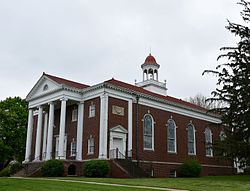William Penn College
| Type | Private university |
|---|---|
| Established | 1873 |
| Affiliation | Quakers |
| President | John E.E. Ottosson |
| Students | 1,050 |
| Location | Oskaloosa, Iowa, U.S. |
| Campus | Rural |
| Colors | Navy blue and Gold |
| Mascot | Statesmen/Lady Statesmen |
| Website | |
|
Penn College Historic District
|
|

Spencer Memorial Chapel (1923)
|
|
| Area | 13.75 acres (5.56 ha) |
| Architect |
A.T. Simmons Proudfoot, Bird and Rawson |
| Architectural style |
Prairie School Colonial Revival |
| MPS | Quaker Testimony in Oskaloosa MPS |
| NRHP Reference # | 96000391 |
| Added to NRHP | April 4, 1996 |
Coordinates: 41°18′32″N 92°38′53″W / 41.3090°N 92.6481°W
William Penn University is a private, liberal arts university in Oskaloosa, Iowa, United States. It was founded by members of the Religious Society of Friends (Quakers) in 1873 as Penn College. In 1933, the name was changed to William Penn College, and finally to William Penn University in 2000.
In 2007, Musco Lighting, also in Oskaloosa, donated $12 million to the school for various projects—the biggest single gift in the school's history. The money was to be used for 200,000 square feet (19,000 m2) of new structures including student recreation, classrooms, laboratories, and a stand-alone Industrial Technology Center building called the Musco Technology Center (MTC), which is home for the expanding Digital Communication Program.
The university's athletic teams compete in the National Association of Intercollegiate Athletics (NAIA). The university is a member of the Heart of America Athletic Conference. Before 2000, the school was a part of the NCAA Division III.
William Penn University's ideal of providing quality education has not changed in nearly 140 years. It has always provided equal access to quality education, without discrimination towards a person's race, gender, age, religion, or national origin. In 1873, the college debated its naming to either Penn College or John Bright College. Penn College opened September 24, 1873 with John W. Woody as its first President, and had its first graduate, Linda Ninde, in 1875. The college grew at a rapid pace till it reached its full maturity in 1910 under President Rosenburg, who under his term, completed the college building, doubled attendance, and enriched and expanded studies. The college's name was legally changed from Penn College to William Penn College in 1933, sparking a controversy whether or not the institution had ceased to exist as an educational institution. That matter was settled once and for all by the Iowa Supreme Court which ruled that Penn College had not ceased to exist as an educational institution. In the year 2000, the name was changed again from William Penn College to William Penn University.
...
Wikipedia
